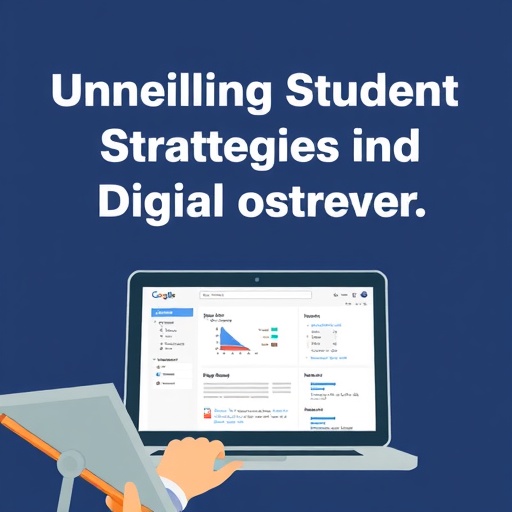In the ever-evolving landscape of education technology, the integration of digital assessment tools is becoming a pivotal aspect of understanding student learning processes. Research conducted by de Schipper, Feskens, Salles, and colleagues delves into the usage of log data to identify students’ solution strategies while navigating digital mathematics assessments. This groundbreaking work promises to uncover the intricate dynamics of learning in a digital environment, enriching our understanding of how students interact with mathematical concepts online.
Digital assessments have transformed the way educators evaluate student performance. However, there remains a significant gap in leveraging the rich data generated during these assessments. The researchers employ advanced log data analysis techniques, which allow for the real-time tracking of student interactions. This methodological approach offers unprecedented insights into how students approach problem-solving in mathematics, enabling a detailed examination of the cognitive processes that underlie their answers.
One of the key innovations of this study is the development of a framework to categorize different solution strategies employed by students. By examining the log data, the researchers identified patterns that indicate specific methods of tackling mathematical problems. This categorization not only aids in assessing individual performance but also provides valuable feedback that could inform teaching strategies. As educators strive to personalize learning experiences, understanding these strategies is crucial for supporting student success.
The implications of this research extend beyond academia; they hold significant promise for educational policy makers and curriculum developers. As the data reveal how students engage with mathematical tasks, there is an opportunity to redesign instructional materials and assessments to better align with actual student behaviors. For instance, if analysis shows a predominance of certain strategies that lead to success, these can be emphasized in educational resources, providing a pathway for improved teaching methods.
Additionally, the use of sophisticated machine learning algorithms to analyze log data offers a glimpse into the future of educational assessments. By harnessing artificial intelligence, the researchers were able to process massive datasets with greater accuracy, identifying correlations and anomalies that may not be readily apparent through traditional analysis. This predictive capability could enable preemptive interventions for students struggling with specific concepts, thus enhancing overall educational outcomes.
Moreover, the study addresses the importance of formative assessment practices. As educational institutions increasingly adopt continuous assessment models, understanding students’ solution strategies can inform timely interventions that support student learning. The insights derived from log data empower educators to tailor their instruction, ultimately fostering a more responsive and adaptive education system.
The authors emphasize the ethical considerations associated with using log data in education. Transparency in how data is collected and utilized is paramount to maintaining student trust and safeguarding privacy. The researchers advocate for ethical guidelines that govern the use of student data, ensuring that it serves to enhance learning rather than compromise student autonomy.
Their findings also point to the significance of teacher training in the context of data-driven instruction. Educators must be equipped with the skills to interpret log data effectively and to translate these insights into actionable teaching strategies. Professional development programs that focus on data literacy can empower teachers to make informed decisions that directly impact their students’ learning experiences.
Furthermore, the research opens avenues for cross-disciplinary collaboration between educators and data scientists. This partnership is essential in harnessing the potential of data analytics in education. Sharing expertise from both domains can lead to the development of more sophisticated tools that cater to the diverse needs of learners, enabling a more holistic approach to education.
As digital mathematics assessments become a staple in classrooms worldwide, the findings from this research underscore the necessity of continual adaptation in educational practices. With technology advancing rapidly, educators must be vigilant in refining their approaches based on emerging data insights. This ongoing evolution ensures that education remains relevant and effective in preparing students for the challenges of an increasingly complex world.
In conclusion, the pioneering work of de Schipper and colleagues in identifying students’ solution strategies through log data represents a significant leap forward in educational research. By critically examining how students navigate digital mathematics assessments, the study not only enhances our understanding of learning processes but also sets the stage for future innovations in education. As we embrace these insights, the potential to improve student outcomes in mathematics grows exponentially, paving the way for a new era in teaching and learning.
Equipped with these insights, educators can begin to close the gap between traditional educational practices and the demands of the digital age. Investing in professional development, ethical standards for data use, and collaborative approaches to teaching can empower educators to harness the wealth of information available from log data. As we continue to explore the intersection of technology and education, the real beneficiaries will be the students, whose learning experiences can be transformed through informed pedagogical strategies.
In a world where data reigns supreme, understanding the nuances of student engagement within digital environments will undoubtedly redefine educational success. The findings from this groundbreaking research highlight the importance of data analytics in shaping the future of education, ensuring that we are not just assessing students, but truly understanding and enhancing their learning journeys.
Subject of Research: Digital mathematics assessment and student solution strategies using log data.
Article Title: Identifying students’ solution strategies in digital mathematics assessment using log data.
Article References:
de Schipper, E., Feskens, R., Salles, F. et al. Identifying students’ solution strategies in digital mathematics assessment using log data.
Large-scale Assess Educ 13, 23 (2025). https://doi.org/10.1186/s40536-025-00259-6
Image Credits: AI Generated
DOI:
Keywords: Digital assessment, log data analysis, solution strategies, mathematics education, data-driven instruction, ethical considerations, professional development.




